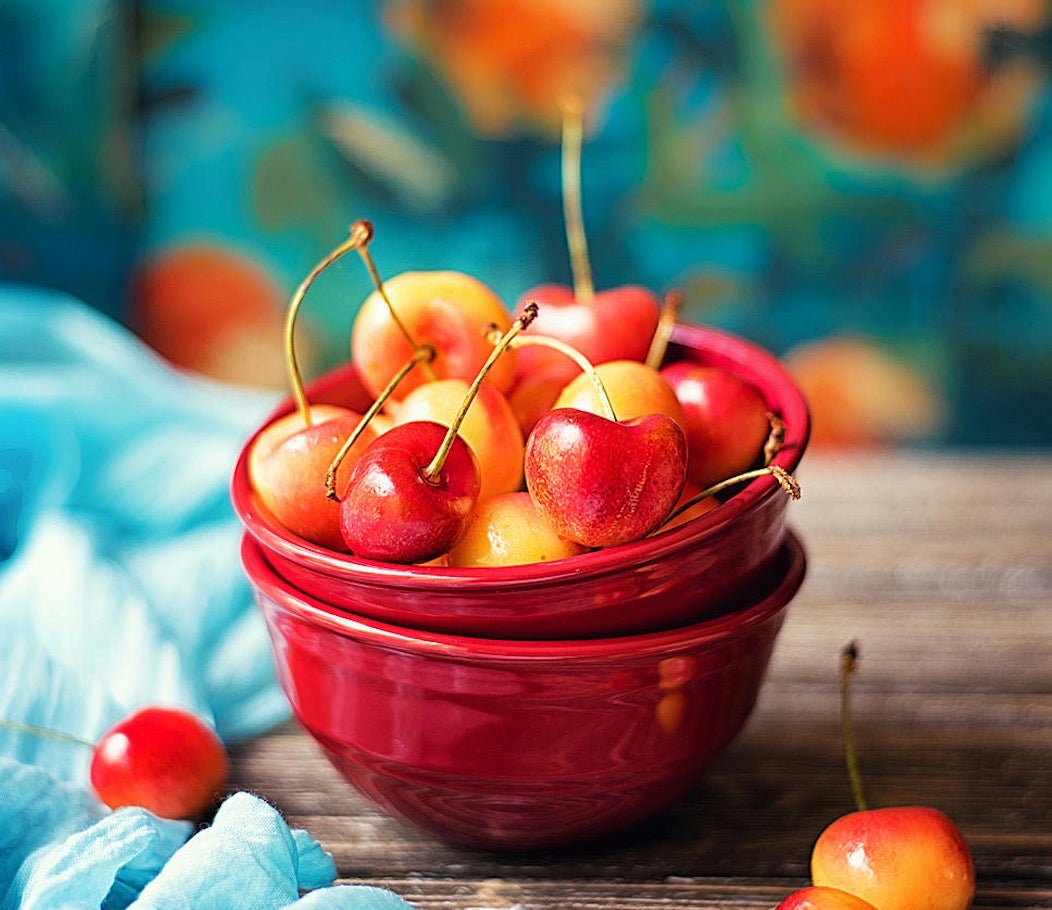
The Top 11 Foods to Help You Fight Stress and Boost Happiness
We've all experienced it, short-term, long-term, physically, or mentally: Stress. It's an innate reaction to life experiences, good and bad. It's something we can't completely control, but we can stay mindful by meditating, running, or listening to music, reading, taking a walk, phoning a friend, or whatever else helps you personally to alleviate tension. One of the most important ways to mitigate stress and anxiety starts with your diet, since certain foods contain vitamins, minerals, and amino acids that boost your brain's "feel good" hormones serotonin, dopamine, and reduce cortisol, often called the "stress hormone."
People deal with stress mechanisms differently, but many of us eat for comfort. If you run to your kitchen to cope with anxiety, tension, worry, or self-doubt, there are foods that you can reach for that will benefit your mood. The Beet complied a list of the top 11 foods to eat that will help you fight stress, boost productivity, and make you feel calmer and more joyful in no-time. Here's what to eat to fight stress and find calm.
1. Tahini Contains an Amino Acid That Treats Anxiety and Stress
Tahini is a sesame spread, the core ingredient in hummus, and prominently used in the Mediterranean diet. You probably eat this regularly without even knowing. This creamy and flavorful spread is an incredible source of the amino acid L-tryptophan, a serotonin precursor that helps reduce stress and anxiety. In a review study, researchers say that L-tryptophan is "verifying a nutritional approach to the treatment of anxiety." A deficiency in tryptophan may lower your serotonin system and cognition function according to a different study. The best to load up on tahini is to drizzle the spread onto your greek salad or dip your favorite veggies in an oil-free hummus!
2. Matcha Powder Contains a Natural Amino Acid That Helps You Relax
This green tea powder is used as a natural caffeine replacement since it doesn't give you the same jittery kick that coffee does, and lasts longer to avoid the crash you're probably familiar with coffee. Matcha gained its popularity over the past few years since the vibrant green color makes for a likable photo opportunity, but has been around for centuries and can be traced back to the Tang Dynasty in China.
Pretty aesthetic aside, matcha delivers some powerful health benefits and is loaded with antioxidants that help reduce stress. In a study, researchers analyzed the relationship between the intake of matcha components and the suppression of stress in a mouse model. Results concluded that a "significant stress-reducing effect was observed." Matcha has a balanced combination of caffeine and L-theanine, which is a natural amino acid found in plants that helps with relaxation without the drowsiness. In a study, researchers note, "L-theanine alone improved self-reported relaxation, tension, and calmness starting at 200 mg. Generally, one scoop of matcha, 1 gram, equals the same caffeine in an espresso shot, or 35 mg of caffeine.
3. Swiss Chard Contains High Levels of Magnesium Reducing the Activation of Stress
This leafy green vegetable is loaded with stress-reducing minerals and nutrients like magnesium. In a review study, researchers examined the "link between magnesium deficiency and stress, focusing on the association between magnesium and various stress pathologies, magnesium’s potential interaction with stress pathways, and magnesium’s effects on the brain." The results concluded that an increase in magnesium may help reduce stress and if you have low levels on this mineral, then you are more likely to activate stressors. In a different study, "findings suggest oral magnesium supplementation alleviated stress in healthy adults with low magnesemia."
One cup of cooked Swiss chard, (175 grams), contains 36% of the recommended intake for magnesium, so this leafy green vegetable is a healthy way to consume this essential mineral.
4. Acerola Cherries Are a Good Source of Vitamin C Which Gets Depleted by Stress
The National Library of Medicine says acerola cherry powder is an untapped functional superfruit. This fruit powder is a rich source of antioxidants like ascorbic acid also known as vitamin C that "appear to be a promising candidate in combating various diseases associated with the oxidative stress," according to the study. When you stress, vitamin C disappears from the bloodstream at an extremely rapid rate, according to Dr. James L. Wilson, author of Adrenal Fatigue: The 21st Century Stress Syndrome. Consumption of vitamin C during stressful times since it's lost in your body. In that case, acerola cherries are your best friend since they are one of the most concentrated sources of vitamin C you will find in plants. One fruit contains 80.5 mg of vitamin C, that's almost more than half the vitamin C in oranges and almost triple the vitamin C in lemons.
5. Kimchi is a Fermented Food that Contains Probiotics That Reduce Social Anxiety
If you love fermented food, say hello to your new favorite snack, kimchi. This cabbage medley is loaded with health benefits, packed with beneficial bacterias, probiotics, and essential vitamins and minerals. In a study, researchers "determined whether the consumption of fermented foods likely to contain probiotics interacts with neuroticism to predict social anxiety symptoms." Results found that the consumption of fermented foods that contain probiotics may reduce social anxiety and stress levels. In a different review study, researchers said, "higher frequency of fermented food consumption was associated with fewer symptoms of social anxiety." In another study, "findings suggest that kimchi is a promising functional food with an antioxidative effect and fermentation of kimchi led to the elevation of antioxidative activity."
6. Artichokes Contain Prebiotics That May Uplift Your Mood
It's no joke that artichokes are extremely high in fiber and promote gut health since they contain prebiotics that may help reduce stress levels. Artichokes are rich in a prebiotic called fructooligosaccharides, often known as FOSs. In a study, researchers tested "whether chronic prebiotic treatment modifies behavior across domains relevant to anxiety, depression, cognition, stress response, and social behavior," results found that the prebiotic FOSs is beneficial for stress-related behaviors and may reduce the stress that builds up in your gut. Depending on your stressful situation, if it's short-term you will experience the stressful pain in your gut which causes constipation, loss of appetite, and slowed digestion. If the stress is long-term you may experience gastrointestinal (GI) issues and should contact your doctor. Another study review suggests, "high-quality diets, prebiotics, and probiotics may beneficially affect mood."
7. Garlic is Often Used as a Therapeutic Food that Protects Cells From Stress
You might add this vegetable to your pasta and bread because garlic's distinctive taste is the perfect addition to any savory dish. But, others may add garlic to food since it's classified as a "therapeutic food," because it contains CYP2E1 inhibitors and CYP3A enzymes that are used to treat diseases like alcoholism, therapeutically. Garlic also contains sulfur compounds increasing the antioxidant called glutathione. "Glutathione provides a critical defense system for the protection of cells from many forms of stress," according to a study.
8. Parsley Reduces Stress and Supports the Cellular Antioxidant Defense System
Parsley is arguably the best ingredient in a roasted veggie dish since it brings out a bitter yet flavorful flavor, but more importantly, this is an essential herb that may reduce stress levels and make you feel a bit more joyful. In a study, researchers examined "parsley-rich diets in terms of eliminating stress-induced oxidative gastric injury were evaluated." The study says "oxidative stress has been shown to play a principal role in the pathogenesis of stress-induced gastric injury." The results concluded, "oral administration of parsley is effective in reducing stress-induced gastric injury by supporting the cellular antioxidant defense system."
9. Broccoli is a Cruciferous Vegetable That Boosts Positive Mental Health
Broccoli is a renowned cruciferous vegetable known for its many health benefits. Several studies claim diets rich in cruciferous vegetables may reduce your risk of cancer, heart disease, and mental health disorders. In one study, researchers investigated different foods that promoted recovery from depressive disorders. The results found that the highest scoring foods were all plant-based and included cruciferous vegetables. Like garlic, broccoli contains the compound sulfur, increasing levels of glutathione, an antioxidant that protects against many forms of stress, according to a study. Preferably, it's healthier to eat broccoli raw since the sulforaphane gets activated when the vegetable is cut, chopped, and chewed, instead of being cooked. To learn more about Broccoli and health benefits, click here.
10. Chamomile Tea Produces Calming Effects and Reduces Anxiety
Traditionally, chamomile tea was used to treat insomnia and induce sedation, calming effects since the herb contains flavonoid, apigenin that binds to benzodiazepine receptors in the brain, medical tranquilizers that relaxes you, according to a study. In a sleep study, researchers concluded that the "inhalation of the vapor of chamomile oil reduced a stress-induced increase in plasma adrenocorticotropic hormone (ACTH) levels." ACTH is a hormone that stimulates the production of cortisol and helps boost the immune system. In a study, researches evaluated the association between cortisol and stress in the body with chamomile therapy among subjects with generalized anxiety disorders. The results found that the 45 participants who consumed chamomile extract over the 8-week period, decreased cortisol levels, and improved anxiety symptoms.
11. Blueberries Contain Polyphenols, Helping Boost Your Immune System and Mood
If you love blueberries, eat more! These small and delicious berries are high in flavonoids, an antioxidant that contains mood-boosting properties according to a study. "Blueberries are rich in polyphenols that may be beneficial to cognitive performance and mood," another study suggests. Polyphenols are micronutrients found in many plant-based foods, especially blueberries, and protect your immune system and help to fight off cardiovascular diseases. The Beet reported on 5 Foods For Better Brain Health, Focus, and Mood, and blueberries were recommended by Dr. Naidoo, a Harvard trained psychiatrist, and professional chef. He said, “Berries are my personal favorite fruit, they're lower on the glycemic index and a great option when adding fruit to your daily meal plan. The bright colors of berries represent the polyphenols, which provide that antioxidant boost.” Cheers.
More From The Beet







